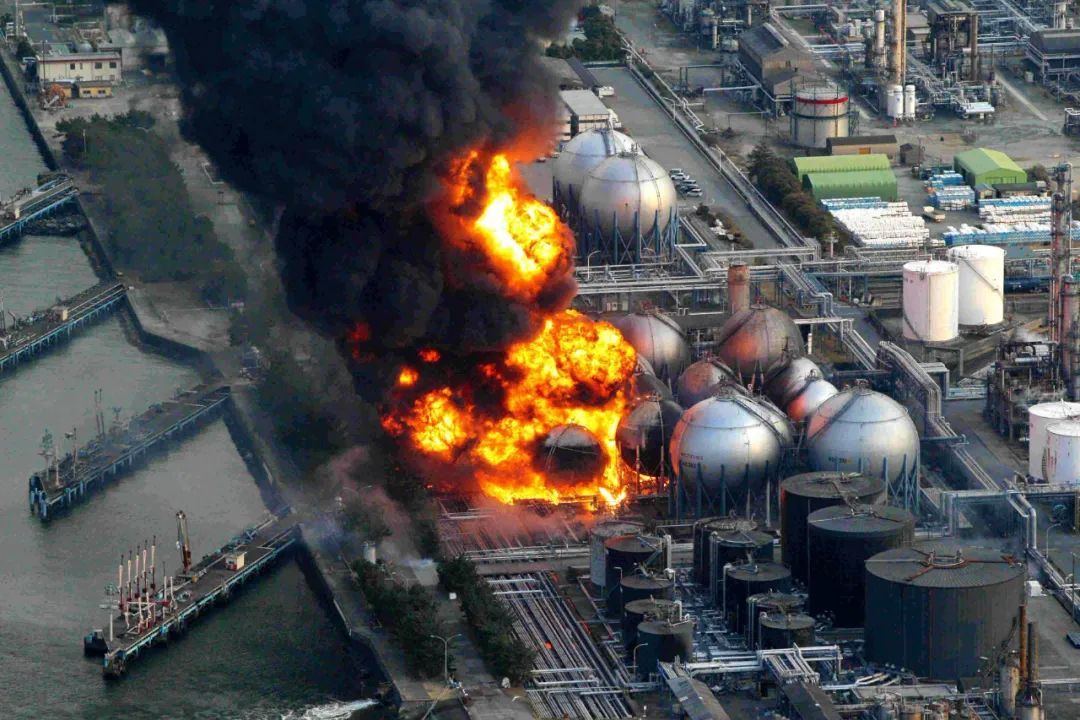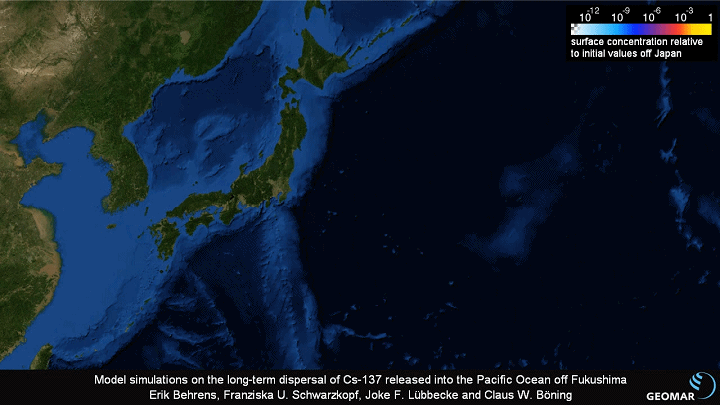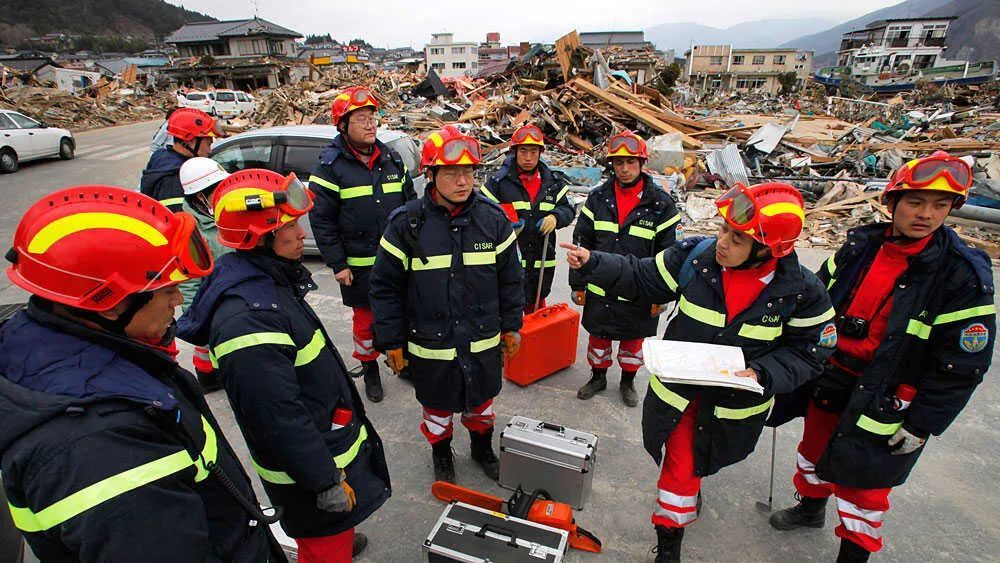Chaoyang Shaoxia: Japan insists on accelerating the discharge of nuclear polluted water into the sea. What bad water is in its stomach?
A 9.0-magnitude earthquake and a 9.3-meter-high tsunami caused the explosion of nuclear power plants and then the core melted down. In Fukushima, Japan on March 11th, 2011, three disasters occurred.

In March 2011, the earthquake triggered an explosion and fire at the Fukushima nuclear power plant in Japan.
The fifth largest earthquake in history triggered the third major nuclear accident in history, resulting in catastrophic nuclear leakage. As early as April 2011, the Fukushima nuclear accident was designated as the highest level of nuclear accident, which was the same as the Chernobyl nuclear accident. In the past 12 years, the Fukushima nuclear accident has produced another 407,000 tons of radioactive waste. There are more than 700 tons of nuclear polluted water discharged into the sea in several large-scale leaks.
Twelve years later, the reconstruction of the disaster area is still advancing at a high speed, while the nuclear polluted water is rising rapidly. At this juncture, the Japanese government has made a formal decision, but it is neither promoting post-disaster reconstruction nor accelerating the purification of polluted areas. Instead, it is necessary to pour nuclear polluted water into the Pacific Ocean and do it this year "in the spring and summer".
So, what is the Fukushima nuclear polluted water? The Japanese government insists on discharging nuclear polluted water into the sea. What bad water is in its stomach?
First, the water that exceeds the standard and exceeds the standard
Fukushima nuclear pollution water mainly comes from nuclear accident cooling water and groundwater or rainwater polluted by radioactive substances, which is completely different from the wastewater generated by normal nuclear power plant operation. There is no precedent in the world to discharge such polluted water into the sea in large quantities. At present, the total amount of nuclear polluted water in Fukushima has reached 1.37 million tons, which is equivalent to more than 700 standard swimming pools filled with water. And this is just the tip of the iceberg. At present, the nuclear polluted water is still increasing at a rate of more than 100 tons per day, and the scrapping process of nuclear power plants is expected to take more than 30 years.
In view of the key steps in handling nuclear accidents — — The delay in taking out the molten residue from the core means that more and more polluted nuclear polluted water will be continuously produced in the future, which will be rapidly eroded by the active ocean current "Kuroshio" along the Fukushima coast.

Simulation effect diagram of German marine scientific research on diffusion speed and influence of nuclear polluted water. As can be seen from the figure, radioactive substances will continue to spread over time, and then spread to the global waters. (Source | GEOMAR)
Different from the wastewater discharged from normal nuclear power plants, the nuclear polluted water in Fukushima, Japan contains more than 60 kinds of radioactive substances. Japan’s processing technology can’t remove radioactive tritium. After practical operation, it was found that even strontium -90 and carbon -14 could not be treated, and the half-lives of these two radionuclides were 50 years and 5730 years respectively.
Tritium will replace hydrogen atoms in the human body, forming long-term radiation in the human body, causing chronic radiation sickness and even cancer. Strontium -90 is highly toxic and can cause tumors in bones and surrounding tissues. The half-life of carbon -14 for thousands of years makes it easy to be enriched in the food chain, causing damage to the DNA of the ingester.
According to expert analysis, there are many abnormal and suspicious measured values in the nuclear polluted water detection data of Tokyo Electric Power Company (Fukushima nuclear power plant operation manager, referred to as TEPCO), which cannot be the basis for determining emissions. TEPCO also admitted that 73% of the treated nuclear polluted water still did not meet the discharge standards. In addition, the nuclear pollution water treatment system has frequent failures, and in 2021 alone, the filter was damaged twice on a large scale.
Japan wants technology, land and land. It can treat nuclear polluted water or expand water storage facilities through technical means, but it chooses to pour nuclear polluted water into the Pacific Ocean. To put it bluntly, it is selfish and irresponsible to avoid difficulties, spend less money and get rid of burdens, so that the whole world can pay for Japan.

In October 2019, after a typhoon, garbage bags containing radioactive nuclear waste were found in the suburbs of Fukushima Prefecture.
Second, the water of lazy politics
Once upon a time, honesty, preciseness and diligence were the labels that the Japanese labeled themselves. Let’s see if this label is genuine.
Fake nature. The history of fraud in TEPCO can be traced back to 1977, and the test data of nuclear facilities have been tampered with more than 200 times, even after the nuclear accident, it still went its own way. In 2021, the matter of concealing the damage of the filter screen of the sewage processor has not stopped. In October 2022, TEPCO was exposed to "prove" the safety of nuclear polluted water to visitors with a "tricky" radiation detector, which made misleading propaganda for large-scale sea discharge.
All these things, is it true that the Japanese government tampered with the history of aggression? Or was it inspired by the Japanese government? Who can believe the data disclosed by TEPCO? Can the nuclear polluted water discharged into the sea really reach the standard?
Man-made disasters happen. If the Fukushima earthquake and tsunami are natural disasters and force majeure, then the Fukushima nuclear accident is a man-made disaster and a tragic human tragedy.
According to the report of the Japanese parliamentary investigation committee, the Fukushima nuclear accident is "not a natural disaster, but obviously a man-made disaster". The Fukushima nuclear power plant was in a state of being hard to resist the earthquake or tsunami, but it never made countermeasures in advance. After the nuclear accident, the Japanese central government’s command system was chaotic, and the crisis management system failed to play its role effectively, which led to the escalating crisis.
In the post-disaster disposal stage, due to the inaction of the Japanese government and TEPCO, the nuclear polluted water of Fukushima nuclear power plant has leaked many times. In August 2013, at least 300 tons of nuclear polluted water flowed into the sea, which was classified as a Class III international nuclear accident, causing a "major abnormal situation", but the Japanese investigation result was a light sentence of "screw loosening".

The residents of Langjiang Town in Fukushima Prefecture were all evacuated after the Fukushima nuclear accident. Until the relevant restrictions were lifted in 2017, the population of Langjiang Town was zero.
Poor disaster relief. "Fukushima nuclear accident victims" once exceeded 160,000, and nearly 40,000 people have left their homes today.
The revival minister in charge of dealing with nuclear accidents has changed 12 times. The first minister resigned after nine days in office for intimidating journalists. Some are suspected of political problems, some are exposed to a scandal, and some actually claim that fortunately, the disaster happened outside the metropolitan area, and it is a "personal responsibility" for some victims to be unable to go home so far.
In the 12 years after the disaster, the nuclear pollution in Fukushima was intractable, and tens of thousands of victims were displaced. However, the most impressive impression given by the minister of rehabilitation turned out to be all kinds of ugliness.

In July, 2011, Ryu Matsumoto, the first Japanese minister of revival, resigned after nine days in office for making inappropriate remarks.
Third, the water of injustice
The Japanese government insists that Fukushima nuclear pollution has reached the discharge standard after water treatment, but why is it strongly opposed in Japan?
Affected by nuclear radiation, many mountain ponds in Fukushima have been abandoned for a long time, and radioactive substances such as natural mountain vegetables and mushrooms have exceeded the standard. The catch of the three major fisheries associations in Fukushima in 2022 was more than 5,500 tons, but it was 20% before the Fukushima nuclear accident.
In Japan, the voice of opposing the sea discharge is higher and higher. Miyagi Prefecture Governor Kazuo Murai asked the Japanese government and Tokyo Electric Power Company to study alternative methods. National and disaster-stricken fishery organizations have repeatedly voiced their voices. Civil society organizations have submitted hundreds of thousands of joint signatures to the Japanese government and TEPCO. People gathered in the streets of Tokyo, Osaka, Shizuoka and other places to oppose the sea discharge and demanded that the Japanese government revoke its decision. Some demonstrators made slogans such as "the ocean is crying, the fish is crying, and the earth is crying".
In the face of surging public opinion, the Japanese government basically ignored it except for holding several symbolic hearings. The revival of the disaster area is far away, and the decision to expel the sea is tantamount to adding insult to injury. Once implemented, it will completely destroy the hopes of those victims who are struggling to survive.

In April, 2021, a protester held a cartoon outside the Prime Minister’s residence in Tokyo, Japan, against the Fukushima nuclear polluted water discharging into the sea.
The Japanese government insists that the discharge of Fukushima nuclear polluted water into the sea will not affect the global marine environment and human beings, but why is it widely questioned by the international community?
Marine and ecological experts pointed out sharply that after the Fukushima nuclear polluted water is discharged into the sea, it will quickly spread to most areas of the Pacific Ocean, thus affecting the global waters. Radiation will be absorbed by marine organisms and enriched into human body along the food chain, which is a great threat to Pacific Rim countries and the ecosystem on which all mankind depends.
South Korea requires Japan to provide transparent and safe information in time and take responsible measures. Pune, Secretary-General of the Pacific Islands Forum, said that Japan should not start discharging the sea until relevant parties confirm the safety of the emission scheme. The EU requires Japan to fully fulfill its national and international obligations to ensure the absolute safety of any emissions.
The United Nations Human Rights Council issued a report urging the Japanese government to face up to its responsibility in the treatment of nuclear pollution. United Nations human rights experts issued a joint statement saying that Japan’s decision to discharge nuclear polluted water into the sea was "deeply disappointing" and "very worrying".
In February 2022, China and Russia issued a joint statement, expressing serious concern about the discharge of Fukushima nuclear polluted water into the sea, stressing that Japan must fully consult with stakeholders such as neighboring countries and relevant international institutions, and properly dispose of it in a responsible manner on the basis of openness, transparency, scientific argumentation and compliance with international law.
After the Fukushima nuclear accident, China, Russia, South Korea, etc. helped Japan immediately. However, Japan bite the hand that feeds it back, ignoring the life, health and safety of the international community and people in neighboring countries, stealing and forcibly discharging nuclear polluted water. There is nothing like this at the expense of others.

In March 2011, the first time after the Fukushima nuclear accident, the Chinese rescue team went to the disaster-stricken areas in Japan to provide assistance.
The Japanese government insists that the issue of Fukushima nuclear polluted water discharged into the sea is under the supervision of the international community, but why did it make a claim before the International Atomic Energy Agency (IAEA) completed its supervision and review?
On January 20, 2023, the IAEA working group ended its review of the regulatory issues related to the discharge of nuclear polluted water in Fukushima, and an assessment report will be released around April at the latest. However, as early as January 13, before the working group set out, the Japanese government unilaterally announced that it would discharge the sea in "spring and summer". This is obviously a slap in the face to the IAEA, and the implication is that you judge you and I rank mine.

Storage tank for storing nuclear polluted water in Fukushima nuclear power plant, Japan.
In addition to ignoring international institutions, violating international laws and rules and fooling the international community, Japan has done a lot: the principle of prudential obligation applicable to the discharge of nuclear wastewater into the sea in international law requires that Japan should exhaust all means to prevent, reduce and control marine pollution, while Japan insists on discharging nuclear polluted water into the sea while it can continue to build water storage tanks; The principle of international cooperation requires that Japan should fully cooperate with neighboring countries and the international community, but Japan did not get the understanding of neighboring countries before announcing its decision to expel the sea. The principle of risk prevention requires that Japan should take the initiative to take preventive measures on the harm of nuclear polluted water, but Japan has always refused to take measures under various excuses.
Fourth, water under the bridge
The Pacific Ocean is the common property of all mankind, not a sewer in Japan, nor a dumping pond for nuclear polluted water. Once the Fukushima nuclear polluted water is discharged into the sea, it may lead to irreparable and profound disasters, and the whole world will suffer. What Japan discharges is nuclear polluted water, and what it discharges is its own conscience.
Three questions to the Japanese government:
One question: where is integrity? Japan has advocated "faith is everything" since ancient times. In dealing with the problem of nuclear polluted water, the Japanese government once solemnly promised to the victims that "no disposal will be carried out without the understanding of the relevant parties". Does the so-called "universal value" boasted by Japan not include honesty? How much darkness and filth is hidden under the humble body?

Many groups and people from many countries in Japan have publicly voiced their voices, criticizing the Japanese government for breaking its promise and expressing strong opposition to the decision to expel the sea.
Second question: where is the axiom? Japan always pretends to be a country that attaches importance to "democracy" and "human rights". In the face of 40,000 victims leaving their homes, strong opposition from all walks of life in China, widespread criticism from the international community, and questioning and warning from academic circles at home and abroad, the Japanese government played a deaf ear and acted recklessly. Is this what a self-proclaimed "democratic country" did? Whose rights does this protect? What does Japan regard science as? Where should we put the global marine ecological security and environmental security, and the people’s right to health and survival in all countries?
Three questions: where is the rule of law? Japan often advocates a "rules-based international order" in high profile, but what it actually does often ignores rules and ignores the rule of law. Isn’t it Japan that fools and prevaricates international institutions? Isn’t it Japan that unilaterally changed the status quo in the Pacific? Isn’t it Japan that violates the United Nations Convention on the Law of the Sea, the Convention on Early Notification of a Nuclear Accident and the Convention on Nuclear Safety?

The Japanese government and TEPCO once made a promise that they would not dispose of the nuclear polluted water without the understanding of relevant parties, but now they go their own way in violation of their promises, ignoring the legitimate concerns and strong voices of the domestic people and the international community and forcing the nuclear polluted water to be discharged into the sea. (Comic | Liu Rui)
Some people say that Japan’s discharge of Fukushima nuclear polluted water into the sea has been approved by the American big brother. I want to say that when Japan kneels down on the United States, it can’t be independent, it can’t be healthy and peaceful, and it can’t get good fruit to eat.
A Japan that falsifies the history of aggression, destroys the international order, and harms the homeland of mankind will never stand erect and become a "normal country".